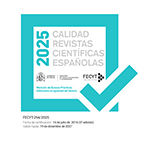'Big Brother' Germany and Spain: a Linguistic Characterization from a Theory of Register
Resumen
The aim of this paper is to justify the suitability of using Big Brother as a means of addressing the study of colloquial register in German and Spanish. Drawing on the conceptualization of register as a continuum (Briz Gómez 2010), in the following pages we examine an unpublished bilingual corpus consisting of conversations in daily routine contexts. The analysis of the data reveals that the situational features are highly colloquial in the interactions studied, and shows a specific display of the following parameters: control on language production, lexical in/accuracy, deixis, un/familiar treatment, syntax, extra/linguistic contextualization and tone. In conclusion, this qualitative study sheds light on the language used in conversations in reality television and lays the foundation to consider Big Brother an adequate corpus for analyzing colloquial register in both languages.
Descargas
Descarga artículo
Licencia
La Revista de Filología Alemana, para fomentar el intercambio global del conocimiento, facilita el acceso sin restricciones a sus contenidos desde el momento de su publicación en la presente edición electrónica, y por eso es una revista de acceso abierto. Los originales publicados en esta revista son propiedad de la Universidad Complutense de Madrid y es obligatorio citar su procedencia en cualquier reproducción total o parcial. Todos los contenidos se distribuyen bajo una licencia de uso y distribución Creative Commons Reconocimiento 4.0 (CC BY 4.0). Esta circunstancia ha de hacerse constar expresamente de esta forma cuando sea necesario. Puede consultar la versión informativa y el texto legal de la licencia.










